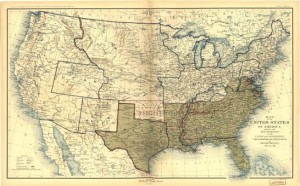 Southern Baptist periodicals waste few opportunities to criticize abolitionist efforts to provide education and social relief services for former slaves. Blacks, after all, are an inferior race incapable of intelligence. Their God-willed lot in life is bondage in the service of whites.
Southern Baptist periodicals waste few opportunities to criticize abolitionist efforts to provide education and social relief services for former slaves. Blacks, after all, are an inferior race incapable of intelligence. Their God-willed lot in life is bondage in the service of whites.
Today’s Kentucky Baptist Western Recorder succinctly sums up the sneering contempt that most white Southern Baptists have for Christians who are equipping freedmen to live independently. In this instance, the Kentucky Methodists are the objects of scorn, for they are practicing “The new gospel, the cornerstone of which is servants obey not your masters.”
While diatribes against abolitionism are routine in the Baptist press of the South, light-headed fare is not unusual, such as this story in today’s North Carolina Baptist Biblical Recorder:
The soldiers must have their fun with every stranger that visits the army.–“Come out of them store clothes!” “Hello, stranger, how much honey you got in your bee-gum?” “I see ’em, you need’nt be trying to hide your hands in them ar gloves!” Such are a few of the salutations with which any one many expect to be greeted passing through the army. But the soldiers do not always get the best of it, as witness the following.
A few months since, while laboring in the army, I was kindly entertained by brother Brown, a deacon of the Pisgah Baptist Church, Orange county, Virginia. Brother Brown is an aged and very venerable looking man. His hair and beard are long and full, and perfectly white. As he was passing through Rode’s Division one day, he encountered a squad of soldiers who greeted him thus. “Good morning, father Abraham,” said one; “Good morning, father Isaac,” said another; “Good morning, father Jacob,” cried a third. The old gentlemen deliberately stopped his horse, and remarked in his blandest tone. “Your are mistaken gentlemen–I am neither Abraham, Isaac nor Jacob, but Saul the son of Kish, sent forth to seek my father’s asses and lo! I have found three of them.” “Sold boys,–bully for you old man,” &c. were the responses of the merry hearted heroes as the old gentlemen rode off chuckling. The wit was well applied, though borrowed.
T. H. P.
Sources: “Dixie Missions,” Western Recorder, January 30, 1864; T. H. P. “A Good Retort,” Biblical Recorder, January 30, 1864 (link)


